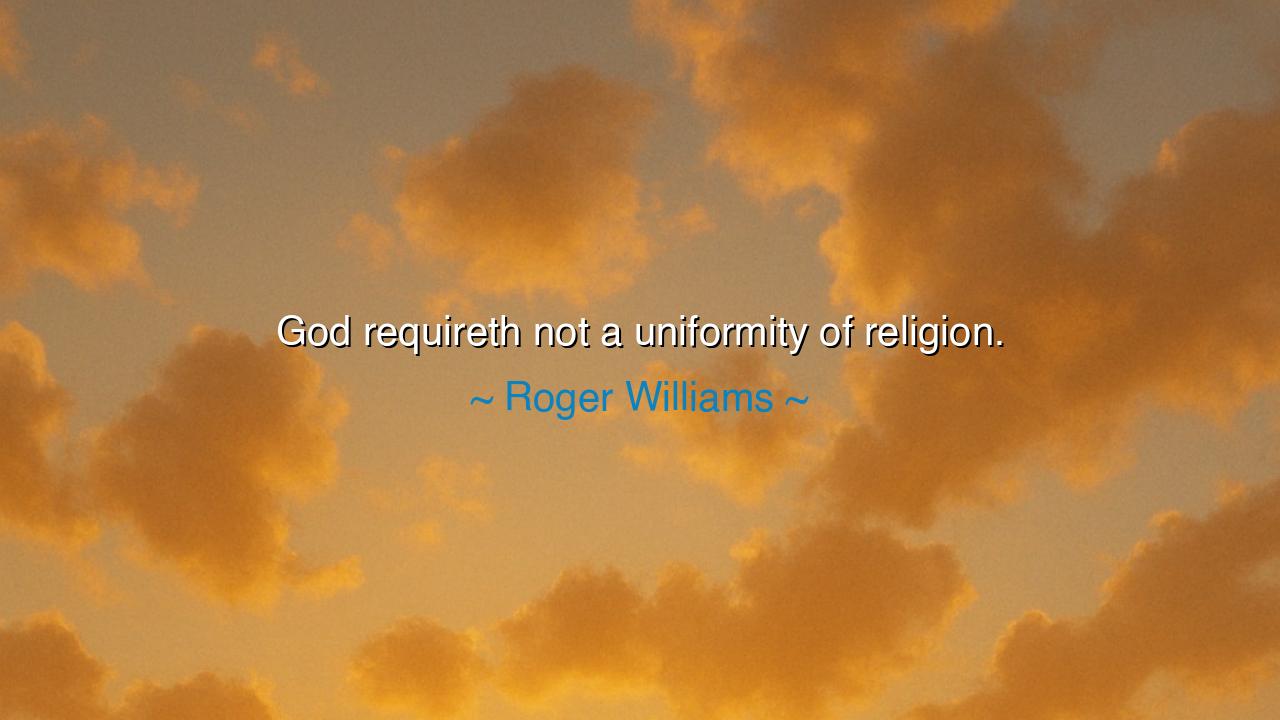
God requireth not a uniformity of religion.






In the sacred journey of the soul, where the divine calls all beings to search for truth, the words of Roger Williams ring with profound wisdom and liberation: "God requireth not a uniformity of religion." This declaration, though centuries old, speaks to the eternal tension between freedom of faith and the desire for uniformity in religious practice. Williams, a Puritan minister and founder of Rhode Island, was one of the early voices in America advocating for religious freedom and the separation of church and state. His words were not merely a critique of the institutions of his time, but a challenge to the very idea that God would demand a single form of worship from all people. Religion, in his view, is a deeply personal and sacred journey, not something to be imposed upon others by force or decree.
In the ancient world, the concept of uniformity in religion was not foreign. Ancient Greece, with its polytheistic beliefs, saw various gods worshipped in different ways, and each city-state had its own religious customs. Yet, even in Athens, the philosophers—such as Socrates—questioned the very nature of the gods and the religious practices of the time. Socrates, sentenced to death for his impiety, famously declared that the divine nature could not be captured by mere ritual, and that true faith was about a personal and intimate relationship with the divine. The philosopher Plato echoed this sentiment by suggesting that the highest form of virtue and truth transcends the bounds of any particular religious system. In this way, both Socrates and Plato foresaw a deeper truth beyond religious uniformity, one that allowed for individual reflection and spiritual freedom.
Similarly, Williams' words echo the teachings of the Buddha, who taught that each individual must seek their own path to enlightenment. Buddhism, with its core principle of individual experience, rejects the idea of a one-size-fits-all approach to spiritual realization. Like Williams, the Buddha saw that spirituality was a deeply personal matter, not something that could be dictated or controlled by a central authority. The notion that each individual can seek their own truth through experience, reflection, and action is central to both the Buddhist and Williamsian vision of spirituality. Just as Williams rejected religious uniformity, Buddhism rejected the rigidity of fixed dogma, advocating instead for a path of self-discovery and inner peace.
The Reformation of the 16th century, led by figures such as Martin Luther, was similarly a profound act of rejecting religious uniformity. The Catholic Church at the time required conformity to its doctrines, practices, and hierarchy. But Luther, in his defiance, nailed his 95 Theses to the church door, rejecting the papal authority and calling for a return to the core principles of Christianity—the relationship between the individual soul and God, free from institutional control. Luther’s challenge to the Church is akin to Williams' call for religious freedom, both rejecting the idea that God demands a singular form of worship or doctrine from humanity. Rather, they both believed that true religion lies in the individual's heart, not in forced conformity to external powers.
In America, Williams’ philosophy took root in Rhode Island, where he established a place of religious freedom, where all faiths could worship without fear of persecution. His vision was revolutionary in the context of his time, as most European nations were still enforcing religious uniformity, with the state and church closely aligned. Williams understood that God's love and truth are too vast to be contained in any single set of rules or beliefs. By establishing a society where religious freedom was protected, he sowed the seeds of the American ideal that would later become a cornerstone of the United States—the separation of church and state.
The lesson in Williams' words is not just about religious tolerance, but about the profound respect for the individual’s relationship with the divine. Faith is not something to be dictated by institutions, but a journey each person must undertake in their own way, seeking truth through their own experiences, understanding, and reflections. Williams’ call to reject religious uniformity is not just a call for freedom of worship but a deeper call for respect for each person’s spiritual journey.
In our own time, Williams' wisdom remains relevant. We live in a world where religious and spiritual diversity is more pronounced than ever before. Whether we follow a traditional faith or create a spiritual path that is uniquely our own, we must honor the right of each individual to find their own connection to the divine. The practical action we must take is to foster an environment of mutual respect, where individuals are free to express their beliefs and search for truth without fear of judgment or persecution. Let us celebrate the diversity of religious and spiritual practices, recognizing that God, in all divine wisdom, does not require uniformity, but seeks the truth in every human heart, however it is expressed.






AAdministratorAdministrator
Welcome, honored guests. Please leave a comment, we will respond soon